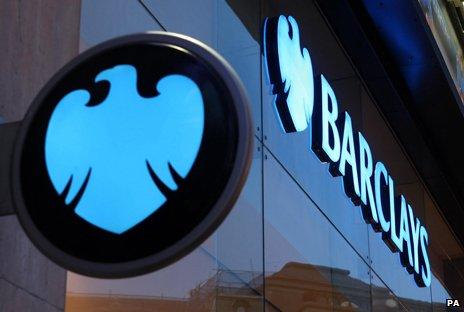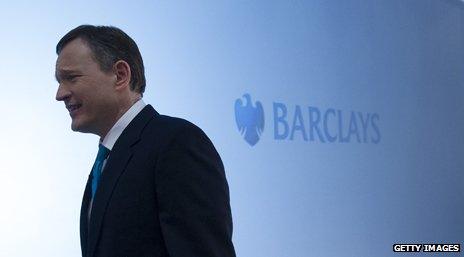Barclays' bonus muddle
- Published
- comments

Here is an odd thing.
When I talk to Barclays' directors and also to regulators about how much that bank allocated to pay what it calls incentives - or bonuses, in most people's parlance - they say that the value of the incentive pool fell 18% to £2.5bn.
But that is not the picture presented in newspapers, or indeed what many investors and MPs believe happened.
They all point to a 10% rise in the so-called incentive pool, to just under £2.4bn.
And the typical reflection on the putative rise is that it is outrageous given that Barclays' pre-tax profits fell in 2013 almost a third to £5.2bn, on the measure preferred and cited by the bank.
What's more, Barclays is years from hitting its main investment target, namely to earn the cost of its equity, or the profits that it would have to generate to adequately compensate owners for the money they invest in the bank.
Last year its return on equity was 4.5%, which compares with the bank's estimate that its cost of equity is 10.5% - and, for what it's worth, some analysts calculate its cost of equity as higher still.
So for Barclays' critics, the bank gave higher rewards to its top people for an operating performance that was - at best - mediocre.
And that seems to corroborate the widespread view that banks are run for the benefit of its boss class rather than for the owners.
Not true, say members of Barclays board. Even regulators, who have become critics of the way that banks construct their remuneration, tell me Barclays has not been as rapacious in its pay practices as it is widely portrayed.
They insist that the number to look at is the incentive pool before adjustment for risk and bad behaviour, or the amount allocated for bonuses and incentives as a reward for the 2013 operating performance, but excluding penalties imposed as punishment for employees for the bank's sins in prior years.
Now this gross incentive pool, with no conduct or risk adjustment, was deliberately reduced by 18% to £2.5bn.
Arguably it was not cut enough, given that profits fell almost a third,
And the bank puts its hand up, and says that lesser drop was deliberate.
Sir John Sunderland, the chairman of Barclays' remuneration committee, writes in the annual report that the "global resignation rate for senior staff in 2013 was significantly above that in 2012", and that departures of senior investment bankers in the US almost doubled - which is why he and his colleagues took a decision to pay what it deemed appropriate to "ensure the health of the franchise".
That translated into 481 Barclays employees earning more than £1m, up from 428 in the previous year, of which 274 are based in the US and 130 in the UK.
For those into "pay porn", 54 of Barclays' people earned between £2.5m and £5m, while eight earned more than £5m.
But if the gross bonus pool was cut, why precisely is the net bonus pool higher?
Well it was because the "risk and conduct" deductions for 2013 - largely penalties imposed on employees for mis-selling PPI credit insurance and interest-rate swaps - were just £290m, compared with deductions in the previous year of £860m (those bigger deductions were the self-imposed punishment for rigging Libor interest rate benchmarks).
A shorthand way of seeing this is that bonuses were down, but maluses (or negative bonuses) were down more - so the net bonus pot was expanded.
Where does this nuanced and complicated pay picture leave Barclays?
Well, directors are fearful that the bank may be humiliated by shareholders when it comes to the annual vote on remuneration, that there may be a large protest vote - even though they briefed influential investors on their pay plans before announcing them, and thought they had their acquiescence.

Barclays' Anthony Jenkins - facing some existential questions?
Also two almost existential questions for Barclays - questions that will certainly determine whether the chief executive Antony Jenkins is deemed to be a success - remain largely unresolved.
First, what is the future of its very large US investment bank, if large Wall Street rivals feel less constrained in how, and how much, they pay their senior bankers? Can Barclays keep its talent, and if it can't, does that matter?
Second, how will Barclays make an adequate return for its shareholders without cutting its operating costs, of which two-thirds are what it pays its people?
To be clear, the rise in the net bonus pool of a couple of hundred million pounds, while of enormous symbolic power, was neither here nor there in a year when operating expenses rose from £18.6bn to £19.9bn.
What disappointed most of its investors most last year about Barclays was a failure to make significant cuts in the bank's overheads.
That failure was less about how much it pays each employee and was much more about how many people it employs.
It is not only the investors who take that view. So does a chunk of the board. The very big pressure on Antony Jenkins is to shrink by many thousands the number of Barclays employees.